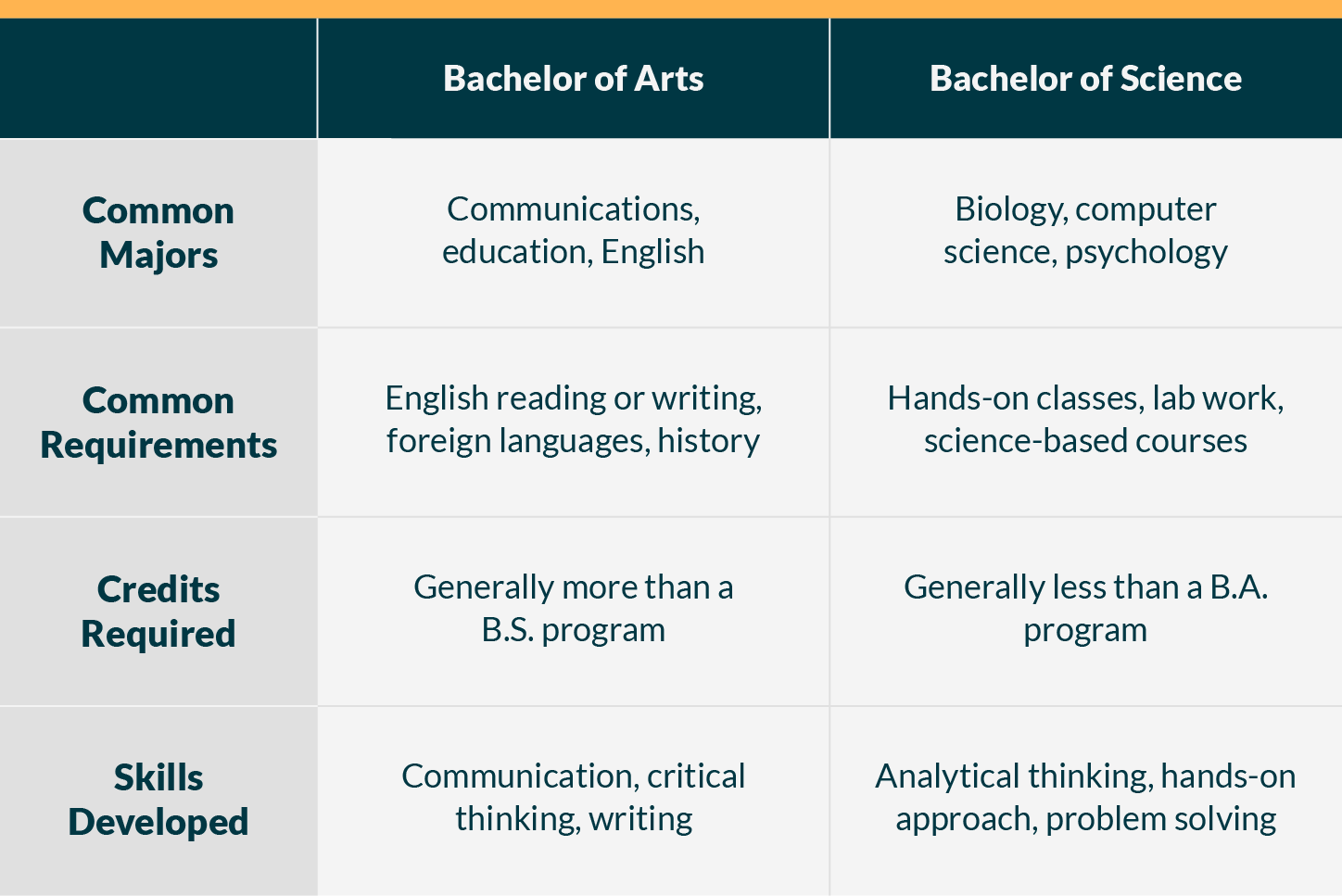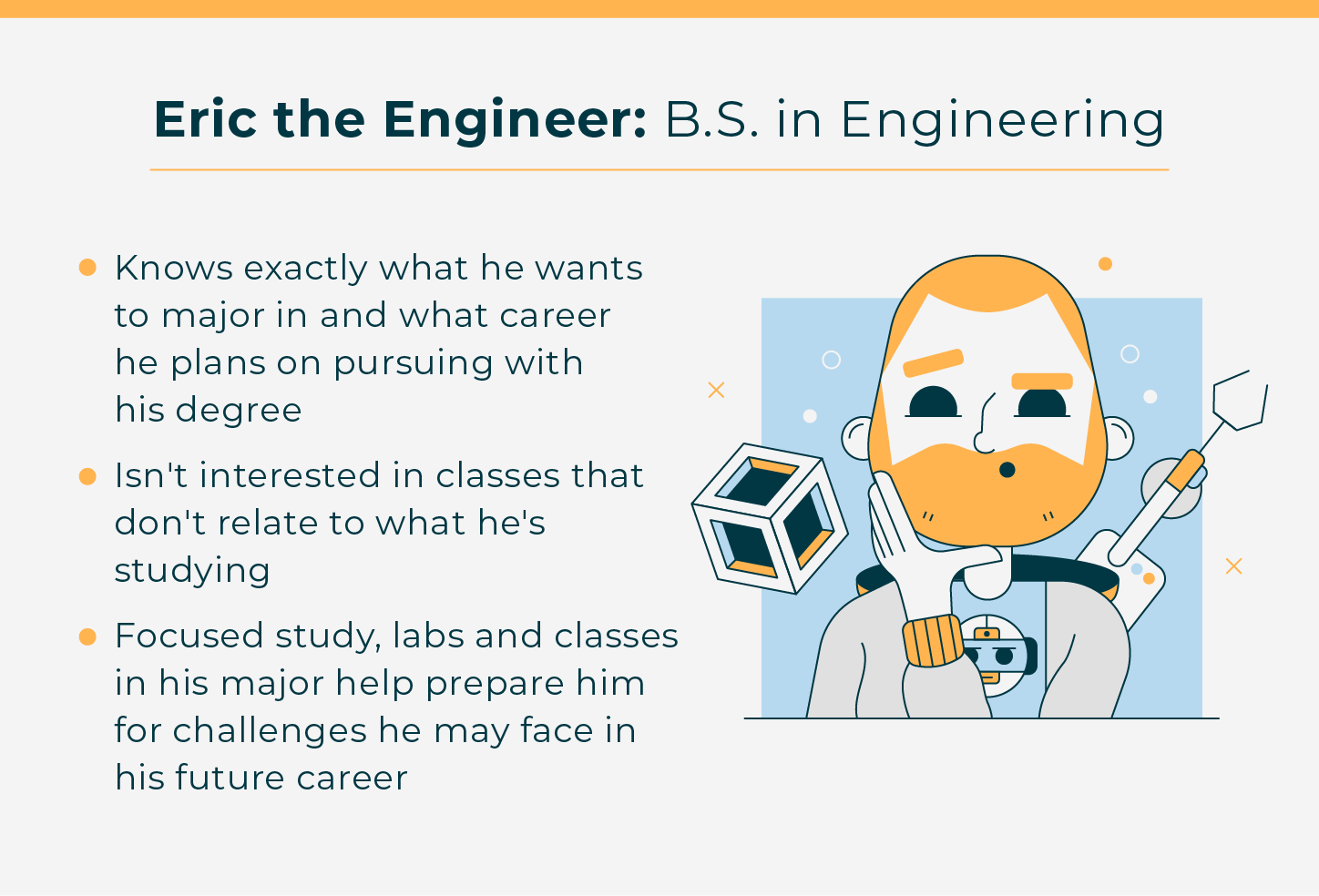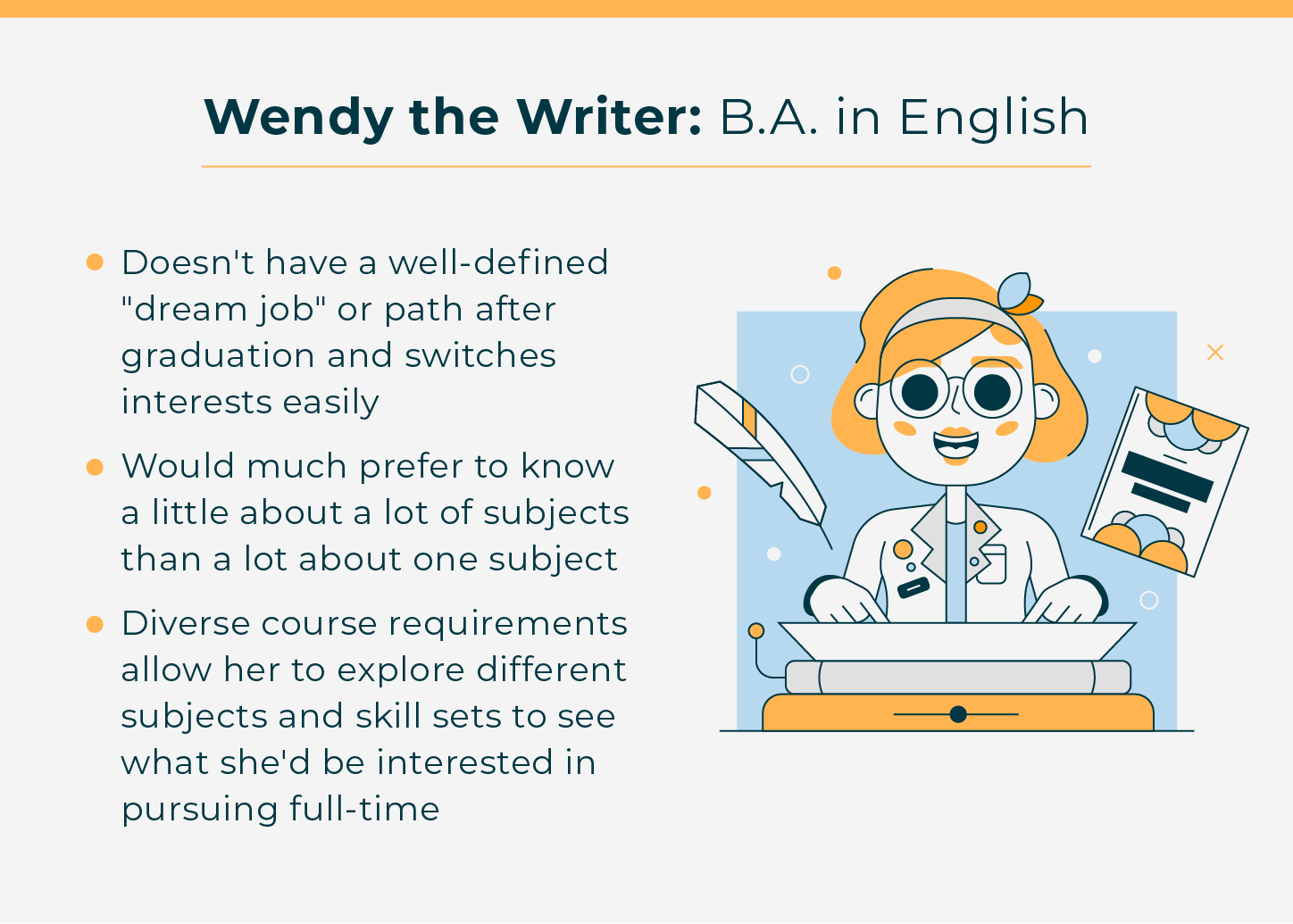The two most popular degree options for college students are the Bachelor of Arts (B.A.) and the Bachelor of Science (B.S.). The main difference between them is the coursework required to complete the degree.
Bachelor of Arts degrees require a more diversified approach to your major by including liberal arts classes with your major coursework. Bachelor of Science programs, however, have a more straightforward and scientific approach to classes, with a narrow focus on your chosen area of study.
We’ve identified the most immediate differences between these two programs in the table below. Read on to familiarize yourself with these degree programs and how to choose the perfect degree program for you!

Bachelor of Arts (B.A.)

A Bachelor of Arts degree, also commonly called a “liberal arts degree,” requires a varied and diverse amount of courses to satisfy the degree requirements. This degree program often requires more credits than a Bachelor of Science degree program, though that varies between schools and programs.
In a B.A. program, around two-thirds of the classes you take relate to liberal arts or the humanities. These programs often have a number of prerequisite courses that don’t relate to your major, but will help give you a better understanding of the world around you.
While Bachelor of Arts programs vary, it’s important to know generally what falls under the B.A. degree track. Here are a few examples of B.A. programs you can expect to see in college:
- Communications
- Education
- English language and literature
- History
- Spanish
For example: An English major might be required to take Victorian Literature, Poetry of the 19th century, two semesters of a foreign language and a history course.
Online Bachelor of Arts Programs
Though exact Bachelor of Arts programs will differ from school to school, we’ve rounded up some of the most popular (and affordable) online B.A. programs out there. From communications to music, we’ve found the best programs out there using our tried and true methodology.
- 30 Best Online Bachelors in Communications
- 15 Most Affordable Online English Degrees
- 35 Best Online Bachelor’s in History
- 10 Best Online Bachelors in Journalism
- 5 Best Online Bachelor’s in Music
Bachelor of Arts vs. Bachelor of Fine Arts
Though exact programs will differ by school, a Bachelor of Fine Arts (B.F.A.) degree encompasses visual art programs, including (but not limited to) painting, theatre, sculpture and fashion design.
The main difference between a traditional Bachelor of Arts and a Bachelor of Fine Arts is the coursework. While a B.A. program focuses on a well-rounded education with a focus on liberal arts, a B.F.A. program has more focused coursework in the visual arts and your chosen major. Two thirds of a B.F.A. focus on visual arts and one third focuses on liberal arts courses.
Bachelor of Science (B.S.)

In a Bachelor of Science degree program, you’ll receive a more specialized, narrow and science-based approach to your chosen field. Students take classes in subjects that supplement their field of study, including hands-on labs or courses that build knowledge needed for a particular major. The specialized nature of this degree program often requires less credits than a Bachelor of Arts degree, though that varies based on both your school and program.
When pursing a Bachelor of Science degree, students thoroughly explore their chosen field. Though B.S. degrees require that students take one or two liberal arts classes as prerequisite courses, the number of class requirements are lower compared to B.A. programs due to the rigor of the classes required. B.S. degrees also include lab classes, where students gain hands-on experience in experiments, dissections and other activities that build knowledge for classwork.
Though Bachelor of Science programs differ from school to school, here are some examples of majors that typically fall under the B.S. degree track.
- Biology
- Computer Science
- Engineering
- Psychology
- Sports Medicine
For example: A Biology major might be required to take Biochemistry, Biochemistry lab, Anatomy, Anatomy lab and one semester of English.
Online Bachelor of Science Programs
Though exact B.A. and B.S. degrees differ based on your program and school, we’ve rounded up some of the best and most affordable Bachelor of Science online degree programs using our methodology. These span from the best to the most affordable, making it easy to see which one works best for you. Check out our degrees page for even more options.
- 15 Best Online Bachelor’s in Computer Programming
- 20 Best Online Bachelor’s in Dental Hygiene
- 5 Best Online Bachelor’s in Economics
- 5 Best Online Bachelor’s in Electrical and Electronics Engineering
- 10 Best Online Bachelor’s in Mathematics
Is a Bachelor of Arts or a Bachelor of Science Better?

While neither a Bachelor of Arts nor a Bachelor of Science degree is inherently “better” than the other, both of these programs are better suited for certain types of students and careers. We’ve identified a few personas of who is best suited for which degree program based on their work style and overall interests. These programs will prepare you differently for certain types of careers, which is also important to keep in mind when choosing between a B.A. and B.S. program.
Eric the Engineer

Eric has always wondered how things are built and how they work, from elevators to boat engines. For Eric and students like him, a Bachelor of Science degree in Engineering is a natural choice as it allows for a hyper-focused study into the topic that interests them the most. Students like Eric aren’t all that interested in classes that don’t relate to what they’re studying; they just want to learn all they can about their field. Labs and classes focusing on these subjects helps these students really understand what they’re studying so they’re as prepared for their future careers as possible.
Bailey the Biologist
An analytical and science-driven person, Bailey wants to understand what makes our brains function the way they do, leading to a pre-med B.S. degree in Biology. This degree track allows students like her to have hands-on lab experiences such as dissections, experiments and cadaver observations; which will help them greatly down the line as doctors, nurses or other healthcare professionals.
Wendy the Writer

Wendy is a writer who doesn’t know exactly what kind of career she wants post-grad. While she loves writing, she would much prefer to know a little about a variety of subjects than a lot about one subject. This makes a Bachelor of Arts degree in English the best choice for Wendy and students like her, as they have a number of course requirements outside of their chosen major. Through taking history courses, foreign languages, fine arts classes and even a math and science course, students like Wendy receive a well-rounded approach to their education that they can use to explore the best fit for them.
Carl the Communicator
As someone who loves to communicate with and see different people’s perspectives, Carl chose to get a B.A. degree in Communications while in college. Receiving a liberal arts degree allows students like Carl to explore different points of view and receive a diverse education that they can then use to their advantage down the road, as journalists, public relations practitioners or in advertising.
Whether you choose a more diversified education with a Bachelor of Arts or more focused coursework with a Bachelor of Science degree, we’ll be here every step of the way through your college journey. From applying to schools to deciding between a computer science or engineering program, we’re here with all the information you need to be a successful college student.





